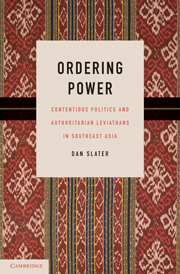Book contents
- Frontmatter
- Contents
- Map, Tables, and Figures
- Acknowledgments
- Map Contemporary Southeast Asia
- Part I The Puzzles and Arguments
- 1 To Extract and To Organize
- 2 States and the Regimes That Run Them
- Part II Contentious Politics And The Institutions Of Order
- Part III The Foundations and Fates of Authoritarian Leviathans
- Part IV Extending the Arguments
- Bibliography
- Index
2 - States and the Regimes That Run Them
Published online by Cambridge University Press: 05 June 2012
- Frontmatter
- Contents
- Map, Tables, and Figures
- Acknowledgments
- Map Contemporary Southeast Asia
- Part I The Puzzles and Arguments
- 1 To Extract and To Organize
- 2 States and the Regimes That Run Them
- Part II Contentious Politics And The Institutions Of Order
- Part III The Foundations and Fates of Authoritarian Leviathans
- Part IV Extending the Arguments
- Bibliography
- Index
Summary
Introduction
We are driven by a common desire to understand what makes for good governments and how to build them. Good governments are those that are (1) representative and accountable to the population they are meant to serve, and (2) effective – that is, capable of protecting the population from violence, ensuring security of property rights, and supplying other public goods that the populace needs and desires.
Margaret LeviThe state.…is the vexed institution that is the ground of both our freedoms and our unfreedoms.
James ScottFew if any political challenges are as persistently portentous as those of democratization and state-building. Wherever citizens are denied the opportunity to remove government officials through competitive elections, they lack an important (if imperfect) institutional means for pressuring public authority to govern in ways commensurate with popular interests. Wherever the state is hamstrung by particularistic demands, or lacks infrastructural power, citizens chronically lack access to even the most basic public goods. It should thus come as no surprise that state-building and democratization have long represented core theoretical concerns in comparative politics.
This is a book about Southeast Asia – but not Southeast Asia alone. As an examination of states and regimes, it speaks to issues that engage the interest of scholars and practitioners working on every region of the postcolonial world. Given the importance of democratization and state-building in the shaping of “the West,” these topics continue to attract the attention of students of European and American political development as well. Before turning our focus to the specifics of Southeast Asia, therefore, it is important to ask what we know about states and regimes in general. Only then can this book's arguments be properly situated and its theoretical contributions appropriately assessed.
- Type
- Chapter
- Information
- Ordering PowerContentious Politics and Authoritarian Leviathans in Southeast Asia, pp. 33 - 52Publisher: Cambridge University PressPrint publication year: 2010



